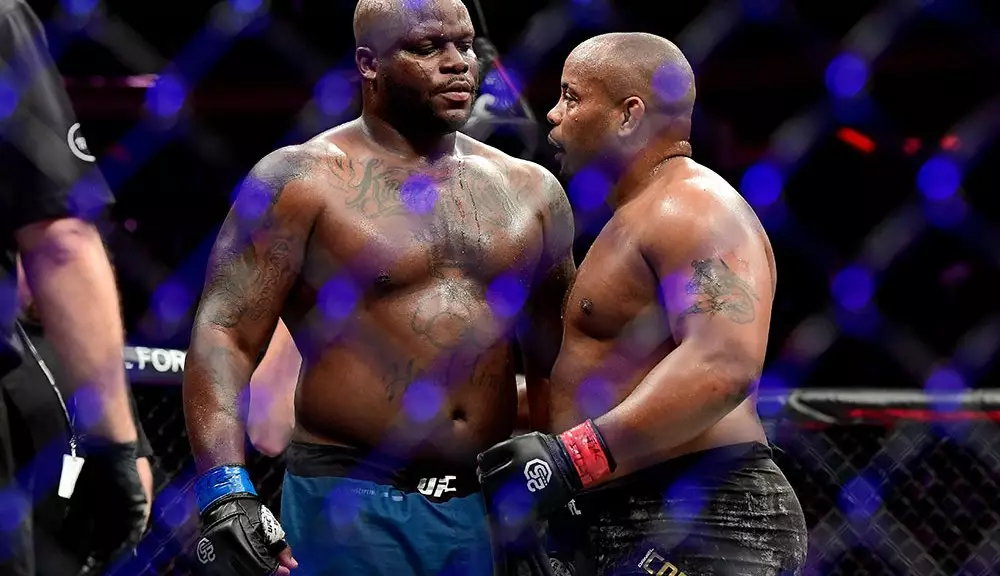The world of Mixed Martial Arts (MMA) is not just about athletic prowess; it often leads fighters into unpredictable territories of personal emotions and professional rivalries. In recent discussions, Derrick Lewis’s feelings towards Daniel Cormier have surfaced, shedding light on the complex relationship that exists within the UFC community. This article aims to analyze the backdrop of their rivalry, delve into Lewis’s expressive statements, and highlight the implications of their interpersonal dynamics on the larger MMA landscape.
Derrick Lewis is known for his larger-than-life personality and his uncanny ability to blend humor with raw competitiveness. However, his most recent comments directed at Daniel Cormier during a media engagement have sparked interest beyond mere banter. Lewis, who holds a professional record of 28 wins and 12 losses, openly expressed his dissatisfaction with Cormier, declaring a desire for a rematch. This overt emotional expression sheds light on how residual feelings from past encounters can linger and affect fighters long after the bout has concluded.
Lewis’s reference to their shared history is pivotal. The two fighters first squared off in 2018, where Lewis’s dream of becoming the UFC heavyweight champion was dashed when he was submitted by Cormier. The aftermath of that fight seemed to sit heavily on Lewis’s shoulders. His yearning for a rematch signals not just a competitive instinct but also a sentiment of unfinished business that many athletes experience when they are unable to reclaim lost glory.
An Unexpected Trigger: Popeyes Chicken
One might find it curious that Lewis’s scorn towards Cormier is anchored by an unexpected trigger: Popeyes chicken. The lighthearted jab at Cormier for “disrespecting” the iconic fast-food chain offers insight into how athletes utilize humor to cope with more serious underlying feelings. Whether or not Lewis’s comment was a part of his comedic persona, it signifies the unique ways fighters process their emotions.
The mention of Popeyes also serves to characterize Lewis as a fighter who blends serious competitive aspirations with humor, often using comedy to disarm and engage audiences. Nevertheless, the fact that it falls upon such a trivial platform to express deeper feelings of resentment hints at the absurdity of rivalries in a sport touted for its brutality. It’s a reminder that fighters are not just warriors in the cage; they are individuals with intricate emotional landscapes.
Cormier’s Reflection and Professional Dynamics
On the receiving end of Lewis’s outburst, Daniel Cormier has maintained his role as an analyst and commentator since retiring from active competition. His past critiques of Lewis, framed as honest assessments of Lewis’s performance, have created a rift between the two. Cormier’s admission of not having seen Lewis for a while before their upcoming encounter in Edmonton only adds more fuel to the fire. He apparently recognizes there is some underlying tension, though his professional demeanor prompts him to approach the situation tactfully.
The swirling dynamics of the relationship point to a broader trend where fighters critique one another, often resulting in tarnished relationships. Cormier’s self-awareness about potentially having offended Lewis indicates a desire to mend fences even as he stands firm on his critiques. This juxtaposition highlights the delicate balance between professional evaluations in MMA and the personal ramifications they may have.
As Lewis prepares to battle Jhonata Diniz, interest in a possible rematch with Cormier looms in the air, reflecting the complexities of their shared past. Whether Lewis’s desire for vengeance stems from a competitive fire or unresolved animosity remains a topic for debate. The rhetoric surrounding their relationship invites spectators to question the significance of rivalries in sports.
Rivalries can deepen respect between fighters or create barriers that inhibit progress. For Lewis, every fight becomes an opportunity to redefine his legacy, while for Cormier, the chance to clarify and possibly reconcile with Lewis presents a personal challenge amidst his analytical duties.
The swirling narrative between Derrick Lewis and Daniel Cormier is more than just that of athletes rebuffing each other’s legacies. It is emblematic of the complex interplay of emotions, humor, and sportsmanship that typifies the world of MMA. As the fighters navigate their personal sentiments against their professional responsibilities, the outcome of this saga could redefine both their careers and their relationship in ways that resonate throughout the sport for years to come.

